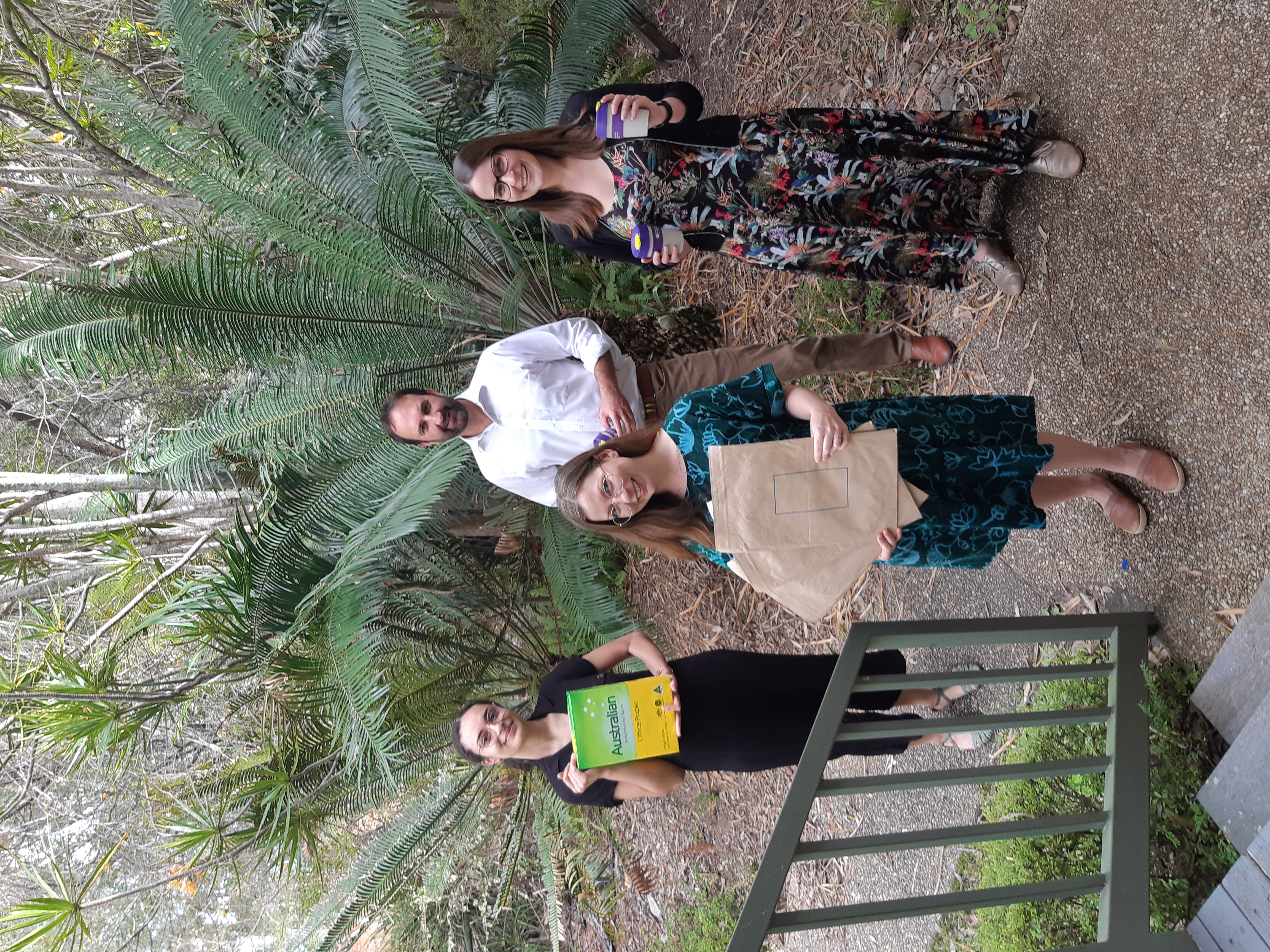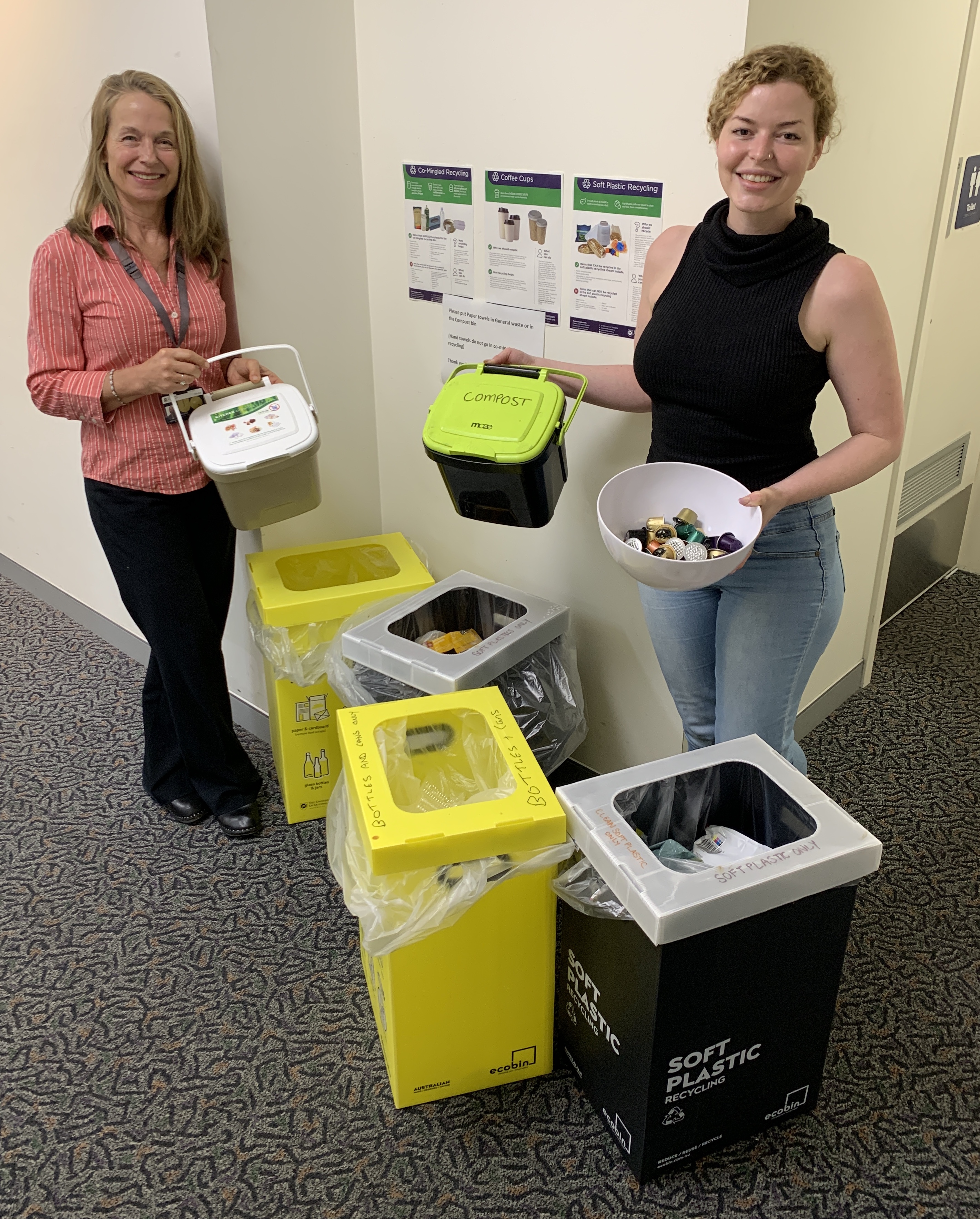Spotlight on Representatives
New Representatives: Felicity Dunning and the UQ Press Sustainability Committee

Established in February 2020, the UQP Sustainability Committee has spent the past year developing sustainable practices that reflect UQ Press’ unique position.
As UQP aims to lead the Australian publishing sector with sustainable solutions and initiatives, reflecting environmental and social values, it was only fitting they establish a Sustainability Committee! It currently involves Director Ben James, Executive Assistant Denise Webb, Editor Felicity Dunning and Sales Manager Chloë Cooper (all pictured).
Their 2020 goals included aligning UQP with external printing partners that share their sustainability objectives, reducing in-office printing, switching to recyclable mailing and setting up waste stations.
These goals were aided from Felicity Dunning attending the first-ever online Green Office training in Semester 1. An editor at UQP, “I volunteered to be the Green Office representative because I’m passionate about how UQP can operate more sustainably, and how we can encourage other publishing houses to make similar changes”.
To accomplish these goals, the Committee ensured their printing partners used best practice according to the Australian standard requirements for paper management, ink, printing, and waste and water management. The Committee reduced printing by encouraging staff to send digital documents and to always print double-sided. A scrap paper tray encourages reuse, and recycled paper is now used in in-office printing. They have added signage about the positive environmental effects of using less paper to further encourage staff.
Diverting waste from landfill is an important, and easy, change you can make to the workplace. The Committee achieved this by setting up stations for soft plastics and organic waste and ensured clear signage so UQP staff know what to put in which bin.
Regarding their publishing business, UQP has shifted to using 100% recyclable jiffy bags for all book orders. To make the ordering process even more sustainable, they have also started trialling digital-only invoices for customers.
In the future, the Committee is assessing the sustainability credentials of warehouse and distribution partners, looking into possibilities for repurposing old and damaged UQP books, and researching UQ’s broader environmental strategies to see how UQP’s office and business practices can align more with UQ’s sustainability strategy.
Experienced Representative: Ann Dunn

“I am passionate about doing what I can for sustainability.”
Ann is one of our most experienced reps, clocking 10 years and making her a GO Rep for over a decade! Ann’s journey began back in 2010 when she first started working for the Faculty of Science. In 2011, she joined QAAFI, or Queensland Alliance for Agriculture and Food Innovation, based at the St Lucia campus.
“I first joined the program to be involved in a group that can make a significant impact. Having completed the training, I firmly believe that more UQ staff and students should be encouraged to participate, especially our leaders, Executives, Directors and Heads of School, who have the potential to influence more people…
“One of the first Sustainability events I went to was an award ceremony where, ironically, I met the green officer and Director of the Centre for Nutrition and Food Science (CNAFS) which is part of QAAFI. At CNAFS, I encouraged new Admin staff to complete the Green officer training and was joined by Liz Eden and Mel Rowan. We had fun doing the annual surveys to record what our staff and students were doing with their rubbish.”
Together, the group of three introduced under-desk paper recycling, organics collection, even acquiring a second compost caddie to just collect paper towels in the kitchenette. Soft plastics recycling and coffee pod recycling schemes have also been implemented to divert more waste from landfill. In QAAFI, Ann encourages others to log off computers and switch off screens, which can save a large amount of energy in the long term.
“I would love to see more [Green Office Reps] at QAAFI, as a larger group of ambassadors setting a good example would have a bigger impact”. Although Ann has had her challenges with involving others in her projects, she says “I continue to set a good example”, ensuring her office is as sustainable as she can make it.
Ann’s story is a testament to how much of a difference one person can make in their workplace. While involving others and creating large-scale change may be challenging and even impossible at times, reps can always continue to set a good example for what a sustainable workplace can be.
“Remote” Representative: Translational Research Institute (TRI) Sustainability Committee

The TRI Sustainability Committee, based at the Princess Alexandra Hospital, is a unique team comprising of UQ, QUT and TRI staff members. Together, they have worked to make the Translational Research Institute more sustainable for all the research groups involved.
The committee formed around March 2019 with 12 keen members. They recognised that all partners at TRI have well-established sustainability departments and pipelines imbedded in their campuses and wished to bring the same to TRI as a whole. While this has proved challenging, as every building level operates under a different partner’s guidelines, the TRI Sustainability Committee is working towards establishing a uniform application of sustainable initiatives across the building.
Now, with 16 members total, the committee already has an impressive list of accomplishments, which are a great ideas list for other Green Office and Labs reps to implement too!
- Implemented battery, stationary, printer cartridge and Nespresso pod recycling.
- Put stickers in kitchens and bathrooms to remind people of water use.
- Lab stickers remind researchers to close fume hoods, switch off centrifuges, and what the warmup energy requirement is for water baths.
- Carbon-neutral paper, wrapper-less dishwasher powder and recycled bottle cleaners have been introduced.
- LCD screens in the building notify of sustainable dates, such as Earth Day.
- Paper-free inductions have been introduced for new students and staff.
- Lamps have been fitted with LEDs and light timers/sensors have been installed in labs.
While COVID-19 hindered some sustainable practices at TRI, such as using single-use paper towels in the bathrooms to mitigate against transmission, most of the above initiatives still ran successfully, with the TRI Sustainability Committee aiming to accomplish even grander goals in the future.
